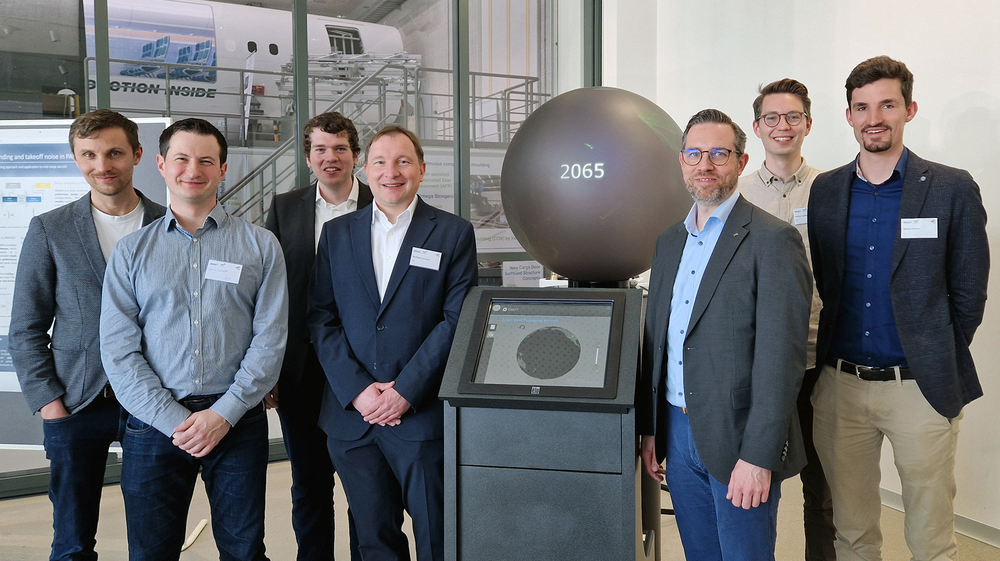Future Scenarios for Aviation at DLR Symposium

- Economic viability of innovations for climate-compatible flying
- Forecasts for global air transport development up to 2070
- Climate impact of future aircraft technologies
DLR Symposium "Architecting Future Aviation"
In early April, the DLR Institute of Air Transport took part in the "Architecting Future Aviation" symposium at the Centre of Applied Aeronautical Research (ZAL) in Hamburg. Organised by the DLR Institute of System Architectures in Aeronautics, the event served as a platform for interdisciplinary exchange on the challenges and opportunities of climate-compatible flying. At the international symposium, the DLR flagship projects EXACT and ALICIA were presented together for the first time, providing a scientific foundation for sustainable aviation technologies.
EXACT designs and analyses technological development paths and their impacts on economic viability and emissions. ALICIA focuses on evaluating new, alternative aircraft technologies and examines requirements for infrastructure, operations, and regulation.
Sustainable Aircraft Technologies in Focus
At the symposium, the DLR Institute of Air Transport presented key research topics of the institute. Discussions included economic and regulatory frameworks for alternative propulsion concepts, emission developments, infrastructure requirements, and strategic pathways for a sustainable transformation of aviation. A joint presentation with the DLR Institute of Maintenance, Repair and Overhaul analysed the competitiveness of sustainable aviation.
The Role of Energy Prices
A central topic was the volatility of future energy and CO2 prices and their impact on the operating costs of various aircraft types. Model calculations explored how different policy instruments, such as CORSIA, the EU Emissions Trading System, or the obligation to blend sustainable fuels (ReFuelEU Aviation), might affect the economic viability of new aircraft technologies.1 These economic frameworks are important for future investments in new propulsion systems.
Electrification of Aviation
The potential roll-out of plug-in hybrid-electric aircraft (PHEA) is expected to increase electricity demand at airports. A case study for Hamburg Airport predicts a total electricity consumption of up to 700 GWh per year by 2050—about seven times the current demand.2 This development not only requires an expansion of the energy supply but also targeted adjustments to the airport infrastructure, such as charging infrastructure, energy storage, and grid stability.
Global Air Transport Forecast
By 2070, global air traffic volume—measured in Revenue Passenger Kilometres (RPK)—could quadruple.3 This growth presents the aviation industry with the challenge of reconciling growth with climate goals. The DLR Institute of Air Transport analyses, using system dynamics models, how factors such as passenger demand, aircraft fleet structure, and flight frequencies might evolve in the future. Different future scenarios are compared to identify environmental and economic policy options.
Climate Impact of New Aircraft Technologies
The future emissions of commercial aviation and their impact on the climate, particularly the global temperature changes caused by aviation, were also investigated. Existing aircraft models are compared with improved or novel aircraft concepts to assess their potential contribution to the reduction of CO₂ emissions and, in particular, non-CO₂ effects.4 The goal is to better understand the climate benefits of future technologies and quantify their impact on the environment.
1 J. Ramm (DLR Institute of Maintenance, Repair and Overhaul), W. Grimme (DLR Institute of Air Transport), "The Impacts of Future Energy Prices and Climate Regulations on the Ranking of Aircraft Technologies", Symposium Architecting Future Aviation 2025, Hamburg, Germany.
2 D. Plesch, W. Grimme (DLR Institute of Air Transport), "Airport and Energy Infrastructure Requirements for Charging Plug-in-Hybrid-Electric Aircraft (PHEA)", Symposium Architecting Future Aviation 2025, Hamburg, Germany.
3 M. Kühlen, Dr. F. Baier (DLR Institute of Air Transport), "Global Impact Assessment: Air Traffic Forecast & Operating Scenarios", Symposium Architecting Future Aviation 2025, Hamburg, Germany.
4 M. Clococeanu (DLR Institute of Air Transport), Dr. K. Dahlmann (DLR Institute of Atmospheric Physics), "Global Impact Assessment: Emissions and Climate Impact of Flight Operations", Symposium Architecting Future Aviation 2025, Hamburg, Germany.
